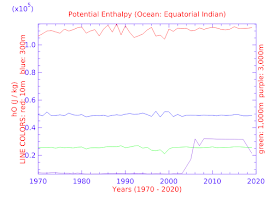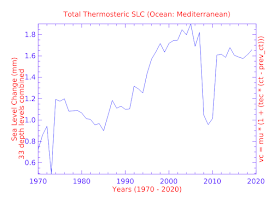 |
| A cover |
I. Background
The previous two posts in this series presented a look at the World Ocean Database Manual's list of maximum and minimum in situ temperature and salinity values for oceans at 33 individual ocean depths.
Those oceans span the entire globe (The Young Old Sea Level Change Hoax, 2).
II. Today
In today's post actual in situ ocean measurements (for the same 4 depth levels previously graphed) are presented covering the past five decades.
The data which forms the graphs in today's post comes from the World Ocean Database.
The gist of this series is to rebut the assumption that thermal expansion is "the" or "a" major cause of sea level change (it has been described as both "the" and "a" major cause of sea level change, depending on the date and depending on the publisher of scientific papers and news sources).
As has been shown over and over again in this and other relevant Dredd Blog series, thermal expansion is neither "the" nor "a" major cause of thermal expansion, because it is only a minor cause of sea level change.
III. The Graphs
The high-level organization of the graphs is by ocean area (e.g. Pacific, Atlantic, etc.).
The graphs are also organized by appendices consisting of Conservative Temperature, Potential Enthalpy, Depth-Level Thermosterics, and Total Thermal Expansion & Contraction.
That order is the same as in the previous posts of this series.
Conservative Temperature is a new dynamic that replaces, in calculations, the stored database value "in situ Temperature" in the old EOS-80 standard; Potential Enthalpy is "ocean heat content" (Potential Enthalpy: A Conservative Oceanic Variable for Evaluating Heat Content and Heat Fluxes, McDougall 2003, pp. 945-46); Depth-Level Thermosterics refers to the thermal expansion or contraction that takes place at specific depth levels described in the World Ocean Database Manual, and is an essential technique for calculating thermosteric changes (JOURNAL OF GEOPHYSICAL RESEARCH: OCEANS, VOL. 118, 953–963); and finally Total Thermal Expansion & Contraction is the sum of those 33 individual depth levels for each ocean graphed.
IV. The Appendices
| Appendices | Link |
| Conservative Temperature | CT |
| Potential Enthalpy | hO |
| Depth Level Thermosterics | tsSLC |
| Total Thermal Expansion & Contraction | ttsSLC |
It may be a while before I do more posts in this series.
Here are some links that offer additional detail (On Thermal Expansion & Thermal Contraction, 2, 3, 4, 5, 6, 7, 8, 9, 10, 11, 12, 13, 14, 15, 16, 17, 18, 19, 20, 21, 22, 23, 24, 25, 26, 27, 28, 29, 30, 31, 32, 33, 34, 35, 36, 37, 38, 39, 40, 41, 42).
The next post in this series is here, the previous post in this series is here.


















































